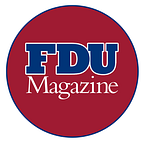Exploring Ecuador in Service to Others
By Kenna Caprio
Tracing their route through Ecuador forms a constellation of sorts — only it’s visible on a map, not in the sky. By the time they’ve completed their alternative-winter-break service trip, Florham Campus students have crisscrossed the country. Bonds strengthen as they connect with their group, the people and the country through cultural-site visits, outdoor activities and, mainly, volunteer efforts.
Service trips are the “most authentic way to see how people in different places around the world really live. I went on the trip to see the world from someone else’s viewpoint,” says Kevin Melia, BS’16, who participated in the January 2016 excursion.
Three-and-a-half years ago, Florham Campus students ventured out on their first service experience in Ecuador — spearheaded by Anne Miksza, assistant director of study abroad. FDU students have cleaned, painted and landscaped a cultural center and taught English to schoolchildren, working in collaboration with Friendship Ambassadors Foundation. Ten to 15 students participate each year. “When else do you get the chance to live in somebody else’s world?” asks Miksza.
Most recently, the group painted school buildings and worked with children in Limón Indanza Canton.
Over the course of these trips, many local children and FDU students develop close friendships with one another. “You couldn’t walk five steps without a crowd of kids coming over to you,” says Jessica Haddad, a sophomore psychology major. One little boy even asked her for English homework. “He really, really was interested in learning.” Haddad suggested he practice writing his name and work on his letters and numbers in English. Another child, a little girl named Sandra, took a particular shine to Haddad, bringing her a small souvenir as a gift. She returned the favor, buying a pink headband with a flower for Sandra, who wore it several times while the group was in Ecuador.
The children took particular delight in learning to jump rope, an activity entirely new to them. “Our students were just amazed by how kids can be entertained by the littlest things,” says Danushi Fernando, campus life coordinator for housing operations and a 2016 trip chaperone. FDU students used plastic tubing in place of rope to teach the children. “Day after day, you’d see these kids with the tubing, skipping rope,” she says.
A variety of service trips have run from the Florham Campus since 2009, when then-Dean of Students Brian Mauro took students to New Orleans, La., to do relief work after Hurricane Katrina. “Students wanted to do more,” he says, and he was eager to tap into the “civic-minded” nature of the campus. Since then, groups have volunteered in Costa Rica, the Dominican Republic, Mississippi and West Virginia, along with at the New Jersey shore and the Navajo Nation, which spans parts of Arizona, Utah and New Mexico.
Beyond doing service work, students forge connections with people living in other cultures and come to appreciate the slower pace and simplicity of their life-styles. “We’re so used to hot showers, Internet and cable TV. Even full kitchens,” says Kristina Barry, BA’16, who went to Ecuador in January. “People cook outside on little grills. We didn’t have hot water in Limón. I realized we complain about the littlest things. We just take so much of what we have for granted.”
Back home she feels a renewed sense of gratitude. “When I’m around my family and friends, I take the time to appreciate them,” she continues. “I’m more concerned with emotionally connecting with people now.”
The whole adventure bonds the travelers, linking them to the land and people in a very personal way.
On the 2015 trip, the Shuar, members of an Amazonian tribe in Ecuador, hosted a social in the small village of Yungantza. “Seeing the two cultures collide — we had so much fun dancing and attempting to talk and communicate — I teared up a little. It was an amazing experience,” says Alexis Banner, BA’15, MAT’16.
Her group hauled rocks, prepped garden beds and dug stairs down to a fishing hole, all in service of the Shuar, who will grow herbs in the beds for use in traditional medicines.
The cultural center, indoors and out, provides space for the indigenous people to teach tourists, local Ecuadorians and young Shuar about their tribal culture. “It’s about keeping their culture alive and preserving it,” says Miksza.
“It was a cultural exchange beyond what I thought was possible,” says Harald Parzer, assistant professor of organismal biology and a 2016 chaperone. “You can make a difference, even in a week.”
Sara Campione assisted with the reporting of this story.
Ed. note: A version of this article first appeared in the Summer/Fall 2016 edition of FDU Magazine.
